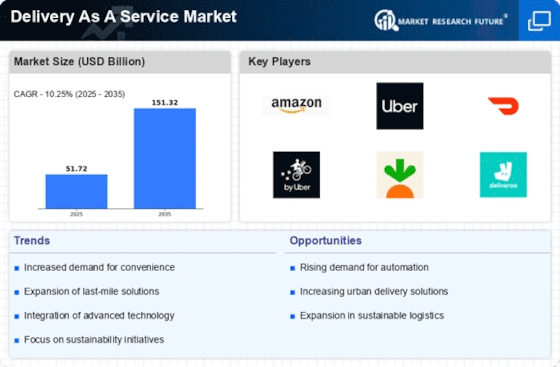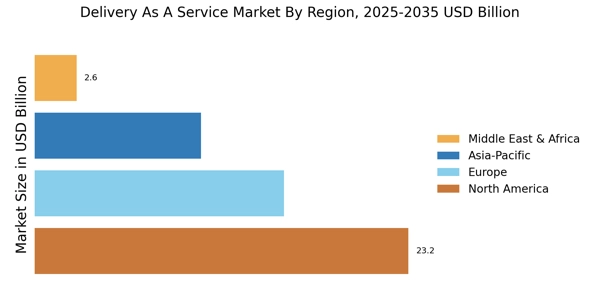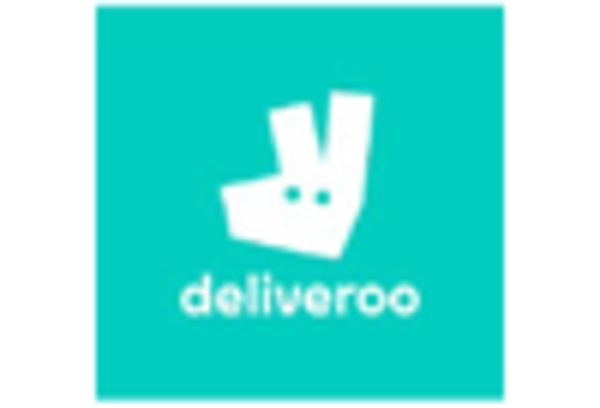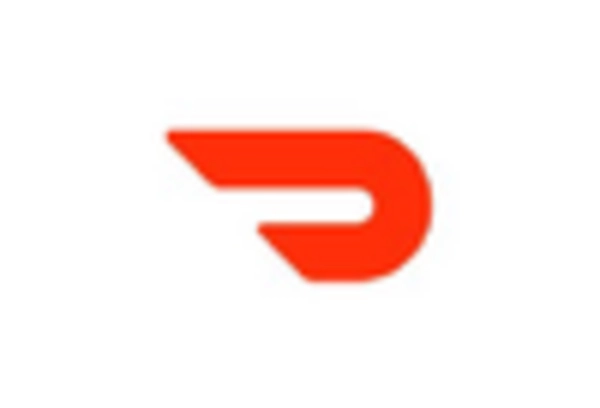E-commerce Growth
The rise of e-commerce has been a pivotal driver for the Delivery As A Service Market. As online shopping continues to gain traction, the demand for efficient and reliable delivery services has surged. In 2025, e-commerce sales are projected to reach approximately 6 trillion USD, indicating a robust market for delivery services. This growth necessitates innovative delivery solutions that can cater to the increasing volume of orders. Companies are now focusing on optimizing their logistics and supply chain operations to meet consumer expectations for fast and reliable delivery. The Delivery As A Service Market is thus positioned to benefit from this trend, as businesses seek to enhance their delivery capabilities to remain competitive in a rapidly evolving marketplace.
Urbanization Trends
Urbanization is another significant driver influencing the Delivery As A Service Market. As more individuals migrate to urban areas, the demand for efficient delivery services increases. Urban centers often present unique logistical challenges, such as traffic congestion and limited parking, which necessitate innovative delivery solutions. The urban population is expected to reach 68% by 2050, further amplifying the need for effective delivery services. Companies are exploring various strategies, including the use of drones and autonomous vehicles, to navigate these challenges. The Delivery As A Service Market must adapt to these urbanization trends to provide timely and efficient services that meet the needs of city dwellers.
Sustainability Concerns
Sustainability concerns are increasingly influencing the Delivery As A Service Market. As consumers become more environmentally conscious, there is a growing demand for eco-friendly delivery options. Companies are responding by adopting sustainable practices, such as using electric vehicles and optimizing delivery routes to reduce carbon emissions. Research indicates that 70% of consumers prefer brands that demonstrate a commitment to sustainability. This shift towards greener delivery solutions not only meets consumer expectations but also aligns with regulatory pressures for reduced environmental impact. The Delivery As A Service Market must continue to innovate and implement sustainable practices to remain relevant in an increasingly eco-conscious marketplace.
Consumer Demand for Speed
The modern consumer's expectation for rapid delivery has become a crucial driver for the Delivery As A Service Market. With the advent of same-day and next-day delivery options, consumers are increasingly prioritizing speed in their purchasing decisions. Research indicates that 80% of consumers are willing to pay extra for faster delivery options, highlighting the importance of speed in the delivery service landscape. This demand compels companies to streamline their operations and invest in technology that enhances delivery efficiency. As a result, the Delivery As A Service Market is evolving to meet these consumer expectations, with businesses implementing advanced tracking systems and optimizing their delivery routes to ensure timely service.
Technological Advancements
Technological advancements play a crucial role in shaping the Delivery As A Service Market. Innovations such as artificial intelligence, machine learning, and real-time tracking systems are transforming how delivery services operate. These technologies enable companies to optimize their logistics, improve route planning, and enhance customer communication. For instance, AI-driven analytics can predict delivery times more accurately, leading to improved customer satisfaction. The integration of technology not only streamlines operations but also reduces costs, making delivery services more efficient. As technology continues to evolve, the Delivery As A Service Market is likely to see further enhancements that will redefine service delivery standards.

















